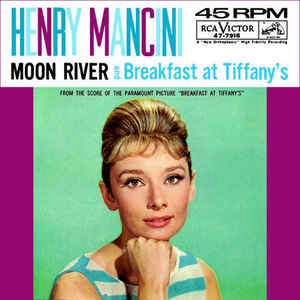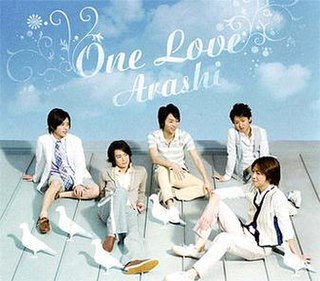
"Moon River" is a song composed by Henry Mancini with lyrics by Johnny Mercer. It was originally performed by Audrey Hepburn in the 1961 film Breakfast at Tiffany's, winning an Academy Award for Best Original Song. The song also won the 1962 Grammy Awards for Record of the Year and Song of the Year. In 1999, Mancini's recording was inducted into the Grammy Hall of Fame.

"My Heart Will Go On" is a song recorded by the Canadian singer Celine Dion as the theme for the 1997 film Titanic. It was composed by James Horner, with lyrics by Will Jennings, and produced by Horner, Walter Afanasieff and Simon Franglen. "My Heart Will Go On" was released as a single internationally by Columbia and Epic on November 24, 1997, and was included on Dion's fifth English-language album, Let's Talk About Love (1997), and the Titanic soundtrack.

Bump of Chicken is a Japanese alternative rock group from Sakura, Chiba. The band members are Motoo Fujiwara, Hiroaki Masukawa (guitar), Yoshifumi Naoi (bass) and Hideo Masu (drums). Since their conception in 1994, they have released 27 singles and 10 albums. They are a popular group in Japan; every release since their third single, "Tentai Kansoku", has charted in the top ten on the Oricon Weekly Charts. Their music has been used in various video games and as theme songs for movies, television shows and anime in Japan.

Mika Nakashima is a Japanese singer and actress. Five of her studio albums, one of her mini-albums and one of her compilation albums have reached number one in Japan's Oricon album chart. She also embarked on an acting career, most notably as Nana Osaki in the live action film adaptations of Nana. She has sold over 10 million records in Japan.
Ai Otsuka is a Japanese singer-songwriter from Suminoe-ku, Osaka, Japan. She is a popular artist on the Avex Trax label and is best known for her 2003 hit "Sakuranbo", which stayed in the Top 200 Oricon Weekly Singles Chart for 103 weeks.

"That Old Black Magic" is a 1942 popular song written by Harold Arlen (music), with the lyrics by Johnny Mercer. They wrote it for the 1942 film Star Spangled Rhythm, when it was first sung by Johnny Johnston and danced by Vera Zorina. The song was nominated for the Academy Award for Best Original Song in 1943 but lost out to "You'll Never Know".

Crescent is the fourth full-length studio album released by Japanese solo artist Gackt on December 3, 2003. It is a concept album linked to its predecessor Moon and comes with booklets for both records. Crescent also features a duet with L'Arc-en-Ciel vocalist Hyde for "Orenji no Taiyou" with whom Gackt co-starred in the 2003 movie Moon Child.

"Can You Feel the Love Tonight" is a song from Disney's 1994 animated feature film The Lion King composed by English musician Elton John with lyrics by Tim Rice. Released as a single in May 1994, the song was a hit in the UK, peaking at number 14 on the UK Singles Chart, and achieved success in the United States, reaching number four on the Billboard Hot 100. The song was a number-one hit in Canada and France. At the 67th Academy Awards in March 1995, it won the Academy Award for Best Original Song. The same year, the song also won John the Grammy Award for Best Male Pop Vocal Performance. Completing a trifecta, the song also won a Golden Globe at the 52nd Golden Globe Awards held in 1995 for Best Song - Motion Picture.

Yui, known as YUI or yui, is a Japanese singer-songwriter and multi-instrumentalist. In her solo career, she sold more than 5 million physical copies in Japan. She is popular in Japan and in surrounding countries, ranking number one in 2011 Count Down TV "Dearest Female Artist" and Music Station "Artist You Most Want to Marry" polls, as well as Radio Television Hong Kong's "Most Popular Japanese Artist".
"Theme from A Summer Place" is a song with lyrics by Mack Discant and music by Max Steiner, written for the 1959 film A Summer Place, which starred Sandra Dee and Troy Donahue. It was recorded for the film as an instrumental by Hugo Winterhalter. Originally known as the "Molly and Johnny Theme", this lush extended cue, as orchestrated by Murray Cutter, is not the main title theme of the film, but an oft-heard secondary love theme for the characters played by Dee and Donahue. The theme has become a canonical representation of the easy listening genre, and is considered by some to be the definitive easy listening track of all time.

"No One Needs to Know" is a song co-written and recorded by Canadian country music artist Shania Twain. It was released on May 15, 1996 as the sixth single from her second studio album The Woman in Me. The song was written by Twain and then husband and producer Robert John "Mutt" Lange. Twain composed the song while working and performing at the Deerhurst Resort in Ontario, Canada. The song was featured in the 1996 film Twister and was also included in the film's soundtrack. It was also the only single from The Woman in Me to not be commercially released; it was included as a b-side in the Australian release of "(If You're Not in It for Love) I'm Outta Here!".
Uverworld is a Japanese rock band consisting of six members and originating from Kusatsu, Shiga. They have released eleven studio albums and over thirty singles and have sold over three million records worldwide.

"Welcome to the Black Parade" is a song by American rock band My Chemical Romance, from their third studio album The Black Parade (2006). It was released on September 12, 2006, as the album's lead single, with the studio version available on the band's Myspace on September 2, 2006. The music video for the single was recognized as MTV's "Greatest Music Video of the Century" in 2017. The song topped the UK Singles Chart, reached number nine on the US Billboard Hot 100 and was named one of the Rock and Roll Hall of Fame's Songs That Shaped Rock and Roll.

"The Woodpecker Song" is originally an Italian song. The music was written by Eldo Di Lazzaro in 1939, while the Italian lyrics were written by Bruno Cherubini. The English lyrics were written by Harold Adamson. The song became a hit in 1940, recorded by Glenn Miller and His Orchestra, The Andrews Sisters, and Kate Smith in 1940.
Hey! Say! JUMP is an eight-member Japanese boy band under the Japanese talent agency Smile-Up. The group is split into two sub-groups: Hey! Say! BEST and Hey! Say! 7. In Japan they sold more than 10 million physical copies.

0079–0088 is a compilation album released by Gackt on December 19, 2007. It contains eight tracks, which had either previously been used on the soundtracks of the Mobile Suit Zeta Gundam movies or were covers of earlier songs from the Gundam franchise.

"One Love" is the twenty-second single of the Japanese boy band, Arashi. The single was released in two editions: a regular edition containing the karaoke versions of all the songs released in the single, and a limited edition containing only the title track and a DVD of the music video. For the first time in Arashi's discography, a song remix of all the three Hana Yori Dango theme songs was included in the Limited Edition release. The single was later re-issued in commemoration of the success of Hana Yori Dango Final with an insert of two-minute dialogue by Arashi member Jun Matsumoto acting as his Hana Yori Dango character Tsukasa Dōmyōji.

"Forget Domani" is a song introduced in the 1964 film The Yellow Rolls-Royce being a composition by Riz Ortolani, who scored the film, and lyricist Norman Newell.

Leo-Nine is the fifth studio album by Japanese singer LiSA. It was released on October 14, 2020, through Sacra Music and Sony Music Japan. Leo-Nine marks the singer's first full-length project in over three years since Little Devil Parade (2017). Like Little Devil Parade, Leo-Nine features a wide range of contribution from composers and producers, including long-time collaborators Pablo, Ryo Eguchi, Koichiro Takahashi, and Shota Horie. The album sold over 66,000 copies in its first week, reaching the number one spot on both Oricon Albums Chart and Billboard Japan's Hot Albums chart. Along with "Homura" debuting at number one on the Japan Hot 100, LiSA became the first artist ever to debut atop the Billboard Japan's charts simultaneously. The album has since received a gold certification from the Recording Industry Association of Japan (RIAJ).















